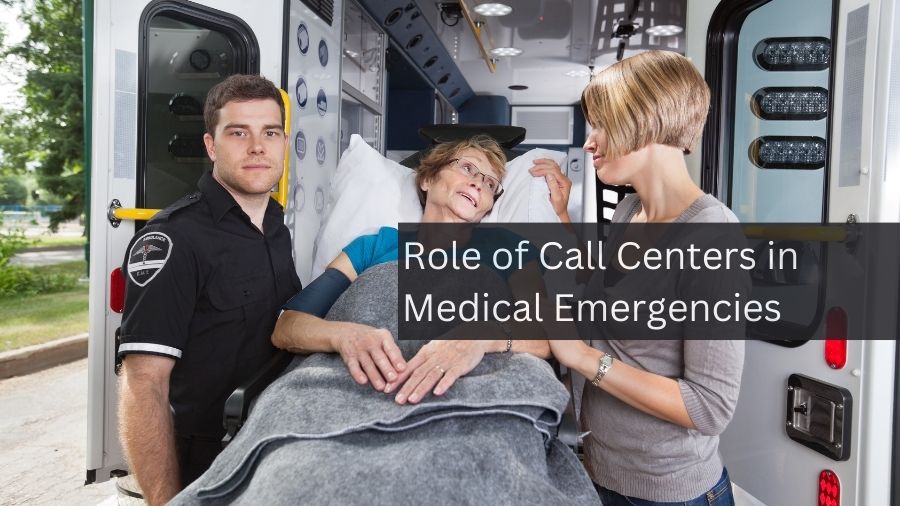In the high-stakes world of healthcare, emergencies can happen at any time. Whether it’s a sudden illness, an accident, or a chronic condition flare-up, immediate and effective communication is vital. Healthcare call centers serve as a lifeline in these critical moments, ensuring patients receive timely and appropriate care. These centers are not just about answering calls; they are about managing emergencies, coordinating with medical services, and providing essential support. Here’s how healthcare call centers can effectively handle medical emergencies, leveraging advanced technology and remote staffing.

Role of Healthcare Call Centers in Managing Medical Emergencies
Immediate Triage and Assessment
- Rapid Response: In an emergency, every second counts. Healthcare call centers handle calls swiftly, ensuring patients or their caregivers are not left waiting. Trained agents quickly assess the situation based on the information provided.
- Triage Protocols: Call centers use standardized triage protocols to determine the severity of the medical issue. These protocols help agents prioritize calls and provide appropriate guidance, such as dispatching an ambulance or connecting the caller to a healthcare professional.
- Recognizing Urgency: Agents are trained to detect urgency in the caller’s voice and questions. They use established protocols to assess the seriousness of the situation and prioritize assistance quickly.
Coordination with Emergency Services
- Direct Connection to EMS: Healthcare call centers often have direct lines to Emergency Medical Services. In critical situations, agents can promptly dispatch emergency responders to the patient’s location. This direct coordination minimizes delays and ensures quick medical intervention.
- Location Tracking: Advanced call centers use technology to track the caller’s location, providing accurate information to EMS. This is especially useful when the caller cannot communicate their location effectively.
Providing Support and Scheduling
- Calm and Empathetic Communication: Patients and their families are often anxious and scared during emergencies. Call centers train their agents to remain calm and provide reassurance. Their empathetic communication helps calm the caller and effectively gather necessary information.
- Continuous Support: Agents stay on the line with the caller until help arrives, offering continuous support and guidance. This constant presence can provide comfort and stability in a chaotic situation.
- Remote Nursing: Some healthcare call centers employ remote nurses, including US-registered nurses (USRNs) based in locations such as the Philippines. These remote nurses provide expert advice and assistance, ensuring patients receive the best care, even in remote or underserved areas.
- Medical Device Monitoring: Call centers can also monitor medical devices remotely to detect any issues promptly. This proactive approach can prevent emergencies and ensure patient safety.
- Dispatching the Right Help Quickly
- Matching Help to Need: Based on the information gathered, the agent dispatches the most appropriate assistance. This could involve sending an ambulance, directing the caller to the nearest emergency room, or connecting them with a qualified medical professional for on-the-phone guidance.
Post-Emergency Follow-Up
- Checking on Patient Status: After addressing the immediate emergency, the call center must follow up to check on the patient’s status. This follow-up ensures that the patient has received the necessary care and provides an opportunity for further assistance if required.
- Scheduling Appointments: Call centers can help schedule follow-up appointments with healthcare providers for patients needing further medical consultation or treatment. This ensures continuity of care and prevents any lapses in treatment.
Leveraging Technology
- AI and Automation: Advanced call centers leverage AI and automation to handle high call volumes efficiently. AI-driven triage systems can quickly assess symptoms and direct calls to the appropriate resources, ensuring no critical call goes unanswered.
- Data Analytics: Utilizing data analytics, call centers can identify patterns in emergencies and optimize their response protocols. This continuous improvement process enhances their ability to manage future emergencies more effectively.
Training and Preparedness
- Regular Training Programs: Call center agents undergo regular training to stay updated on the latest medical guidelines and emergency protocols. This ongoing education ensures that they are well-prepared to handle any medical crisis.
- Simulation Drills: Conducting simulation drills for various emergency scenarios helps agents practice their response and refine their skills. These drills prepare them to act swiftly and accurately in real-life situations.
Compliance and Confidentiality
- HIPAA Compliance: Ensuring patient confidentiality is paramount. Healthcare call centers adhere to HIPAA regulations, safeguarding patient information during and after the emergency call.
- Secure Communication Channels: Secure communication channels protect sensitive patient data and maintain trust and integrity in emergency responses.
The Importance of Healthcare Call Centers in Addressing Medical Emergencies.
Healthcare call centers are an essential component of the medical emergency response system. They play a critical role in managing crises by providing immediate triage, coordinating with emergency services, offering support, and delivering emotional reassurance. Integrating technology, remote staffing solutions like remote nursing, continuous training, and adherence to regulatory standards further enhance their effectiveness.
At Fusion CX, we design our healthcare call center solutions to handle medical emergencies with precision and compassion. Contact us today to learn how we can help your healthcare organization deliver exceptional emergency care.
Are you looking to hire a Call Center Outsourcing Services provider? Visit Fusion CX

